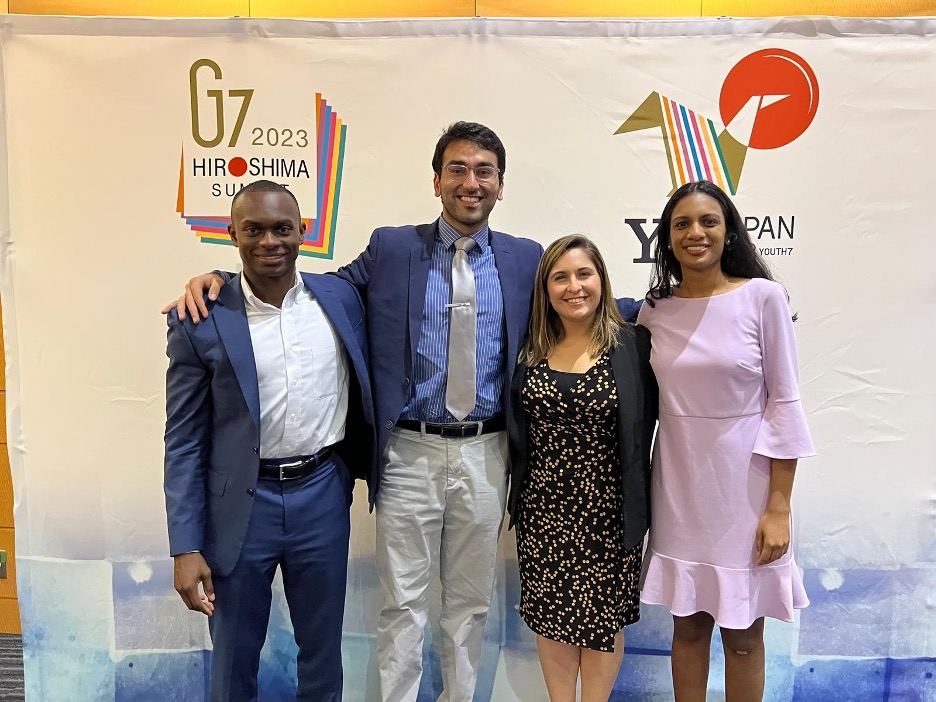
By: Nina Vendhan, Alphaeus Hanson, Monica Schroeder, Behrad Bakhtiari
YPFP Youth G7 Summit Delegates | June 17, 2023 | Photo Credit: U.S. Y7 Delegates
In April of this year, we attended the 2023 Youth G7 Summit in Japan as U.S. delegates. Before the summit, we collaborated with the youth representatives from the other G7 countries during months of policy negotiations. At the summit, we finalized our policy proposals and published our communique, which we presented to Japanese Prime Minister Fumio Kishida. This piece summarizes the main points of our communique along five tracks, which we hope will lead to fruitful policy discussions. The G7 countries wield immense influence and thus must lead the way in implementing inclusive and forward-looking policies that also incorporate youth perspectives.
Economic Resilience
The organizing committee divided the focus of the economic resilience track into two main areas, employment and labor and economic security. Discussions yielded ideas on how to create a more inclusive labor market, upskill workforces, and secure sustainable supply chains. As deliberations continued, we created sub-tracks to further capture the comprehensive recommendations proposed by delegates. These included human capital development, entrepreneurship, equitable labor market, and economic circularity and diversification.
As the U.S. delegation, we proposed that the G7 countries take more deliberate action to secure supply chains with suggestions and guidance for companies on nearshoring, friend shoring, and reshoring. The G7 governments should also designate those materials that are vital to critical infrastructure. The U.S. Department of Commerce captured much of this in their Critical Mineral Strategy, but a focus on generating guidance for the private sector received extra emphasis from delegates at the summit. We also proposed the creation of a digital platform to connect companies offering apprenticeship programs to youth who have completed online certificates using platforms like Coursera and Udemy, and also to standardize those certificates so that companies can easily identify skills that candidates possess. The main focus of all delegates was on skills and competencies rather than university degrees, because the future economy will require a dynamic workforce with more, necessary digital skills for the 4th industrial revolution.
Digital Innovation and Transformation
Our recommendations for the digital innovation and transformation track highlighted how the G7 countries must improve technology access, especially in rural areas, by implementing digital learning into school curricula. Bolstering digital literacy will reduce the digital divide between rural and urban populations, in turn narrowing the education gap. As more marginalized students gain technical skills, they will be able to pursue high-skilled jobs, reducing income inequality and building a sustainable economy.
In addition, it is imperative that the G7 countries explore and adopt emerging technologies, particularly in sectors that have been historically stagnant like healthcare and education. Reducing barriers to entrepreneurship will promote technological innovation which can help solve some of the world’s most pressing social issues, including those related to climate change and health. The Y7 also encourages the G7 countries to implement governance frameworks that promote digital rights and the safe and ethical use of technology. It is crucial to ensure that technology systems do not exacerbate biases and inequities.
Technology will undoubtedly significantly shape our societies in the coming decades and should be employed as a force for good. The Y7 delegates believe that by prioritizing digital literacy, emerging technologies, and the ethics of technology, the digital revolution will better and more equitably benefit future generations.
Climate and Environment
Recommendations to the G7 prioritized three key topics within climate and environment: ensuring a just and equitable transition to clean energy sources, restoring biodiversity and protecting ecosystems, and prioritizing and financing resilient human settlements.
Discussion on ensuring a just and equitable transition addressed the critical need to reduce dependency and overall proliferation on fossil fuels, while ensuring safeguards for those most affected by climate change. Biodiversity negotiations discussed, among other topics, ending deep sea mining as a major preventative factor to ensure the seabed is protected and marine life remains undisrupted by commercial, profit-seeking activities.
The US delegation led the Y7 negotiations on resilient human settlements. By 2030, 40% of the world’s population will be living in vulnerable housing, with climate hazards comprising a significant contributing cause. With a greater number of people living in cities, the need for sustainable infrastructure that can withstand disasters and slow-onset events—in particular housing and transportation—is greater than ever.
With these priorities in mind, our climate and environment recommendations to the G7 balanced mitigation and adaptation with a strong social inclusion focus to advance solutions that protect both people and the planet.
Global Health and Happiness
Y7 delegates discussed how the G7 leaders can forge a path toward a healthier and more prosperous future by centering health needs in policies and future frameworks. Prioritizing underrepresented groups worldwide by addressing disparities in access to health resources and reducing health outcome gaps is critical. Our collective efforts must extend beyond the G7 countries, working collaboratively to establish robust and accessible public health systems.
The communique rightly underscores the urgency of increasing equitable access to health resources, particularly for under-serviced groups. We must bridge the gaps in health outcomes experienced by individuals and marginalized communities across the globe. The well-being of these communities is crucial for the overall progress and prosperity of societies.
Looking toward the future, global public health systems must provide robust and accessible services for all, irrespective of location or socioeconomic status. Furthermore, it is paramount that there is equal support for mental and physical health. By utilizing social prescription, we can establish a proactive approach to health, focusing on prevention and early interventions. Strengthening and promoting societal health literacy will further empower individuals to take control of their own well-being while facilitating prevention and early intervention strategies to pave the way for a prosperous and inclusive future. Elevating the well-being of individuals and societies will be key to fostering a healthier, happier world.
Peace and Security
The peace and security track centered around Russia’s illegal invasion of Ukraine and nuclear non-proliferation, among other ancillary topics. The delegation visited the Hiroshima Peace Memorial Museum and listened to testimony from Keiko Ogura, a Hiroshima atomic bomb survivor. The experience highlighted the need for progress towards disarmament and non-proliferation, concepts Y7 delegates agreed on in the Communique. Although the deliberations surrounding Russia’s invasion of Ukraine were intense, delegates agreed to condemn the invasion and Russia’s threat to use nuclear weapons. Discussion within the track set the table for the G7 countries to cover the same timely and pressing issues.
The 2023 Y7 delegates from the United States included Alphaeus Hanson, Nina Vendhan, Behrad Bakhtiari, and Monica Schroeder. Al Hanson is a Strategic Emerging Trends Advisor, Nina Vendhan is a venture investor, Behrad Bakhtiari is a clinical research assistant and an upcoming medical student, and Monica Schroeder is the Director of Global Advocacy at Build Change, where she works to prevent housing loss caused by disasters and climate worldwide.



